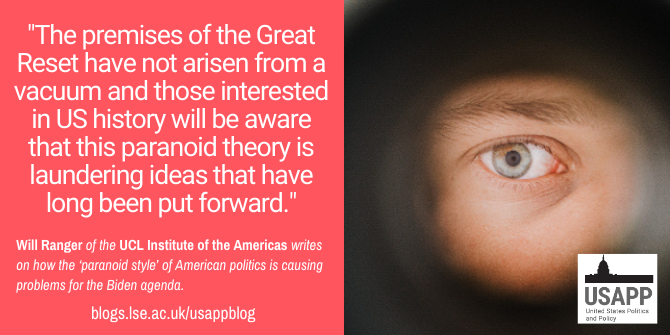How the ‘paranoid style’ of American politics is causing problems for the Biden agenda
As US politics becomes increasingly polarized, many Republicans are basing their opposition to Democratic policies not on evidence, but on paranoia-fuelled concerns about changes to their way of life, writes Will Ranger. He comments that many conservatives are embracing a ‘paranoid style’ of politics which sees a desire by international institutions for a coordinated response to global challenges, such as the World Economic Forum’s ‘Great Reset’, as existential threats, and that these fears are now affecting President Biden’s agenda.
Discussions of conspiracy theories are currently in vogue in American political discourse. Most notable are those which have come from the darker corners of the internet and have become mainstream among the Republican base such as Pizzagate and QAnon. Although these more ‘out there’ ideas have been normalised for a surprisingly significant number of American voters, the notion of conspiratorial thinking in American politics is not new.
The historian Richard Hofstadter famously described the ‘paranoid style’ of American politics in the 1960s in a series of works focused on the prevalence of anti-intellectual tendencies in American social, cultural and political life. Other scholars have developed this idea to gain a greater understanding of subjects ranging from the Christian Right and contemporary discourses of race. A new idea is gaining ground among the conservative grassroots and old tropes in American political culture are being recycled to neatly explain the chaotic times in which we live.
Conservative media and ‘The Great Reset’
‘The Great Reset’ is the latest term for an idea that has been in the conservative imaginary for a number of years. The argument goes that a project from the World Economic Forum (WEF) entitled ‘The Great Reset’ is an attempt to fundamentally erode American capitalism, democracy, civil liberties, culture, and sovereignty in favour of a new centrally planned economic order with decision-making made by a group of central bankers and political elites. One of main proponents of this argument is the conservative radio host Glenn Beck and other affiliated personalities on his network The Blaze.
Conservative media has long been able to manufacture wedge issues to create short-term political gain- the ‘Ground Zero’ Mosque springs to mind as a memorable recent example. Paranoia about “what’s coming”- a phraseology often deployed by figures like Beck- is taking root in the collective conservative mentality, and if Joe Biden and the Democrats wish to win the next set of elections, it is essential that they remain focused on improving Americans’ material conditions rather than fighting battles on unfamiliar mental terrain.
The name ‘The Great Reset’ itself comes from an idea put forward by the WEF which seeks to create a coordinated response to a number of crises facing the international order, with particular emphasis on climate change and the response to COVID-19. The WEF argues that their objective to turn the global crisis of the pandemic into an opportunity to reform how global governance and economics works, thereby ensuring that transnational problems like climate change can be mitigated before we reach a point of no return.
The premises of the Great Reset have not arisen from a vacuum and those interested in US history will be aware that this paranoid theory is laundering ideas that have long been put forward. For instance, Beck and others like Sean Hannity and Rush Limbaugh have railed against sustainable development on the grounds that it was part of a UN attempt to control the world’s population. It is increasingly clear that the Great Reset has gained a foothold both in the minds of the conservative grassroots and lawmakers on Capitol Hill are taking note.
How the paranoid style is affecting Biden’s agenda
Last year the nomination of Biden’s choice for Comptroller of the Currency Saule Omarova was derailed after Republican Senators accused her of secretly being a communist. In one exchange, Senator John Kennedy (R-LA) remarked: “I don’t mean any disrespect. I don’t know whether to call you professor or comrade”. Not only did this rhetoric echo the some of the rhetoric of the Great Reset alarmists, but Beck himself had railed against Omarova’s nomination since the initial announcement in October 2021.

Photo by Mario Heller on Unsplash
Omarova’s nomination was subsequently withdrawn by the Administration to placate the increasing paranoia of Republican members of the Senate Banking Committee, but a similar situation has developed in opposition to the budget Reconciliation Bill currently stalled in the US Senate. Beck is not alone in conservative media in vocally opposing the Reconciliation Bill, but his commentary does encapsulate the existential dread and insecurity that many conservatives in the US are currently experiencing. It is not clear if the Reconciliation Bill will pass the Senate and even if it fails it will likely be because of Democratic opposition, however Republicans on Capitol Hill are increasingly participating in a discourse that portrays the Biden Administration as a vehicle for an irreversible transformation of American life.
Although the tropes of this discourse may not be new, the circulation of paranoid ideas in the conservative media ecosystem is starting to have an impact on policy outcomes in Washington and in state houses across the country. This mentality is worth understanding and contextualising as a failure to do so may see Biden’s entire policy agenda derailed. More troublingly, the prevalence of this mentality risks a Republican majority Congress in 2023 legislating in response to absent threats all the while neglecting the deepening fissures in American social and cultural life.
Republican opposition and policies are increasingly fuelled by paranoia
What is noteworthy, however, is how scholars of the American Right have increasingly noticed a trend of conspiratorial thinking taking root in the conservative movement, calcifying into something at odds with reality, and influencing policy discourses. In his book America’s Right: Anti-Establishment Conservatism from Goldwater to the Tea Party, Robert Horwitz notes the many of the conspiratorial elements of the Tea Party were somewhat rooted in some aspect of traditional conservatism in the United States.
However, Horwitz also notes that elements of the Republican base not only reflexively oppose Democratic policies but justify their opposition with a paranoia that is fundamentally removed from reality. For instance, extremists like those affiliated the ‘sovereign citizens’ movement are exerting such an influence that local GOP lawmakers are enacting policy to benefit them.
Understanding the conspiratorial angst of American conservatives as articulated in this new version of the paranoid style is essential for an administration which wishes to enact an agenda that addresses people’s material conditions. Figures like Beck may genuinely believe what they are saying but it is increasingly evident that fears of ‘corporate communism’, whatever this may mean, are animating a vocal portion of the American Right.
Although Biden may not be able to tackle the causes of this ideological insecurity, the Republicans are looking likely to capitalise electorally on these fears. Enacting the radical changes necessary to fight climate change, heal American society, protect civil rights, and fight a host of other issues will become impossible in the face of Republican politicians catapulted to power by this darker form of the paranoid style.
Please read our comments policy before commenting.
Note: This article gives the views of the author, and not the position of USAPP– American Politics and Policy, nor of the London School of Economics.
Shortened URL for this post: https://bit.ly/3IGxVr4
About the author
Will Ranger – UCL Institute of the Americas
Will Ranger is a first-year PhD student at UCL’s Institute of the Americas. He holds a BA (Hons) in Politics and Modern History and an MA (Hons) in History from the University of Manchester. His current work applies an histoire des mentalités approach to post-WWII American history with specific focuses on civil religion, collective memory and nationalism in US society and culture. Twitter: @WSRanger


